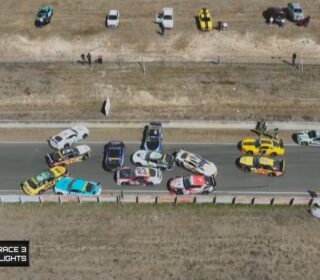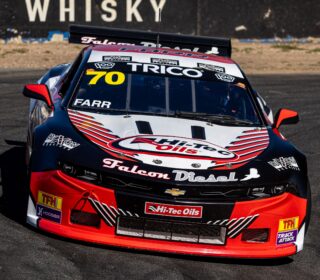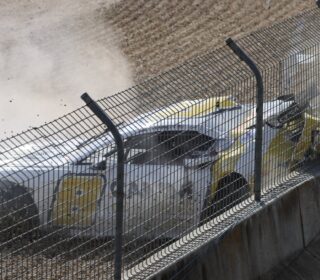COMMENT: THE PUNISHMENT AND THE CRIME

SEVERAL YEARS AGO, in 2011, Craig Baird was given a drive through penalty for creeping at the start of a Porsche Carrera Cup race at Phillip Island.
WORDS: Richard Craill SCREEN GRAB: Fox Sports / Kayo Sports
On pole, Baird’s 911 rolled the sum total of perhaps 10mm before the lights went out.
However, the Kiwi champion was penalised and punished by the rules of the day which stated that if you were judged to have jumped or rolled at the start you’d be given a drive-through penalty. A 35-second trundle at 40km/hr through pit lane that killed a weekend and converted pole to only 11th by race’s end.
The explosion post-race was enormous, with calls of Baird being ‘Robbed’, the ‘Punishment not fitting the crime’ and even a ‘travesty of justice’. In the end it actually led to change in the National Competition Rules that resulted in the much more appropriate 5-second time penalty for similar infringements that is commonplace today.
However, Baird was punished – fairly or not – by the rules of the day for doing something he was judged to have done. By a human, judge-of-fact watching from race control.
Baird did not intend to roll at the start, nor did he do it maliciously. But the call was made, the error judged as being exactly that and the punishment handed down as per the rule book of the day.
Sound familiar?
Checking Social Media on the Monday morning following the Canadian Grand Prix was supposed to be a hopeful exercise of seeing if Ferrari had finally beaten Mercedes-AMG and if Daniel Ricciardo had converted qualifying pace into race results.
They had not and he did, but few were commenting on the Australian’s form.
The firestorm of commentary on the penalty for Sebastian Vettel’s re-join in front of Lewis Hamilton filled the twitter timeline, with everyone from armchair experts, more informed commentators and former world champions denouncing the penalty and the fact it cost the Ferrari driver the race.
Race. Defining. Moment. ?️#CanadianGP ?? #F1 pic.twitter.com/053sau3we1
— Formula 1 (@F1) June 9, 2019
And, for the record, I agree.
In terms of punishment fitting the crime, it did not seem to line up.
Formula One’s new ownership have spoken at length about their desire to improve the show and the narrative of what unfolded in Canada certainly fit their designs.
Ferrari and their World Champion, in the lead of a race, not far from home and grimly holding on from the best driver of a generation in the best car – despite a mistake that saw him forced off the road.
In a perfect world the moment would be replayed, the wild re-join in front of the Silver Mercedes scrutinised and Vettel would have gone on to win the Grand Prix and inject life into what has gradually descended into a rout of 1988 proportions by Lewis and his boys and girls from Brackley.
The FIA, on the other hand, had other ideas and the panel of stewards – that included notable racing drivers like former Grand Prix and LeMans ace Emanuale Pirro – decided that the Ferrari’s re-entry to the circuit was dangerous, in breach of the rules and worthy of penalty.
STEWARDS' REPORT ?
— Formula 1 (@F1) June 9, 2019
A full look at the decisions the race stewards made in Montreal, that ultimately led to Sebastian Vettel's 5-second penalty#CanadianGP ?? #F1https://t.co/tUYXQ4fFhj
In this case, it was five seconds added to Vettel’s race time which almost instantly handed the win to Hamilton.
This judgement was by their own rule book and judged by human beings watching from racing control and giving their interpretation of the rules at the time.
Sound familiar?
Regardless of the decision the Stewards took, and I also think the penalty was too harsh! I would like to ask you to be respectful to @Emanuele_Pirro not only a hugely successful racing driver but above all a loving father, husband & one of the kindest individuals! #NoToBullying pic.twitter.com/R6BKCcVwD9
— Maro Engel (@MaroEngel) June 9, 2019
The penalty issued was a problem, of course. But if Sebastian Vettel had not ended up in the grass in the first place, much in the same way Baird had not jumped the start at Phillip Island, then it wouldn’t have been an issue at all.
And don’t just take my word for it, Journalist Joe Seward – who by a factor of more than one thousand has seen more Grands Prix live than I – agrees.
It’s clear the FIA’s rule book and interpretation of what makes good, hard, tough racing could probably do with a refresh in the same way that the outcry over Baird’s jumped start caused change on our shores.
There are 4 stewards who need to agree, not only 1 driver steward. But also they need to apply the rules as written, a tough job I do not envy on a day like today, like a ref in football.
— Allan McNish (@allanmcnish) June 9, 2019
What’s more, Vettel making a tiny error under searing pressure from the current World Champion wasn’t exactly a surprise given the stakes involved and the impressive and disturbing track record of both the team and its lead driver in managing to engineer themselves out of Grand Prix victories this year.
Ferrari have appealed the call – they were almost compelled to do so from the moment it was announced – and there is a small chance they’ll win. But only a small one.
In the meantime, this is one of those instances where context and moderation is required, especially when social media commentary is involved and attacks become personal.
It is, however, a defining moment that you would hope can be learned from, on both sides of the argument.
The penalty sucks, sure, and it definitely didn’t fit the crime.
But if the crime wasn’t committed in the first place, there’d have been no penalty to worry about.
And so we race on..







